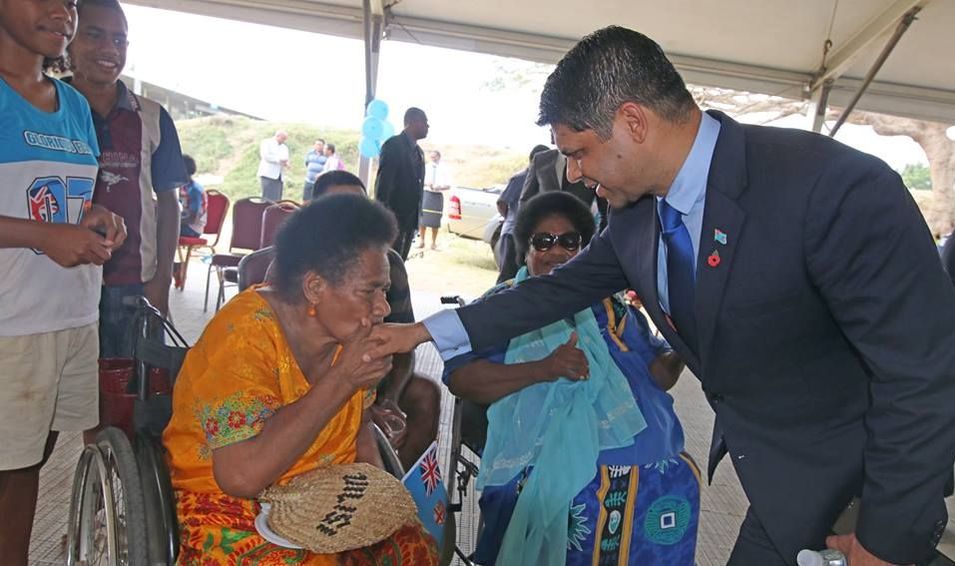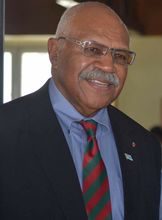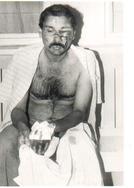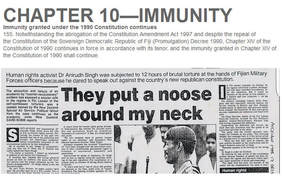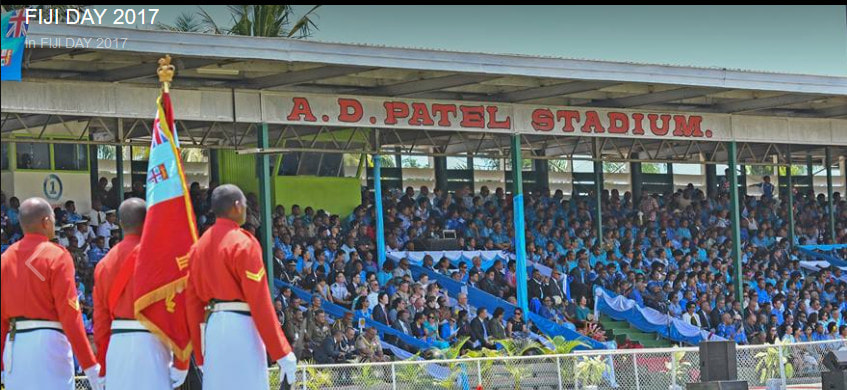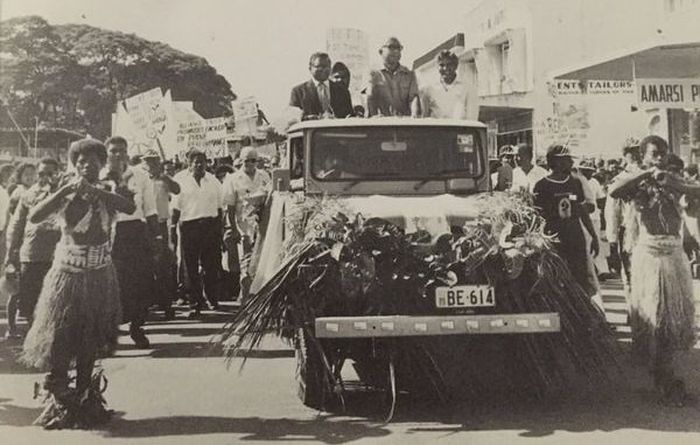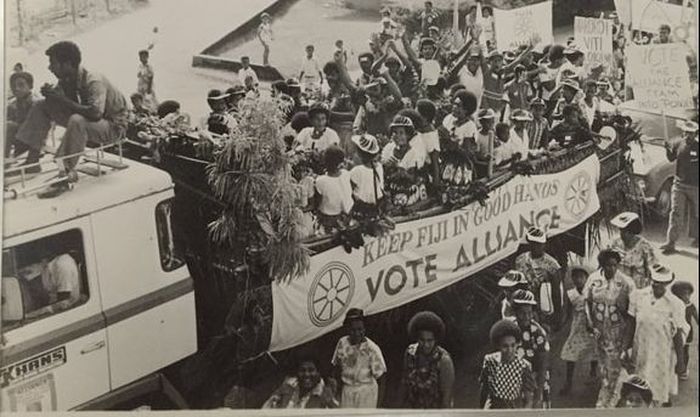“I personally believe that the traditional leaders as represented by the Bose Levu Vakaturaga (BLV) and the Leaders of the Tenant Community should
continue to dialogue." - SITIVENI RABUKA, 9 October 2017
As we have reminded previously, the Father of Coups was very quick to rape, beat, terrorize, lock up and expel Indo-Fijians, moderate native Fijians and Others who opposed his coup but since 2006 was hiding like a church mouse from Bainimarama's coup until he was made SODELPA leader, and now calling INDO-FIJIANS and their leaders as "TENANT COMMUNITY". It is most likely that Rabuka's message was written by Niko Nawaikula who, as NLTB board secretary and manager of Legal Services, was responsible for the eviction of hundreds of Indo-Fijian 'tenant farmers'. Incredibly, the very chiefs had made Rabuka (he imposed himself) as their LANDLORD - as chairman of the Great Council of Chiefs (BLV). He claimed the chiefs were gullible and could be easily manipulated by the commoners
Fijileaks: Sitiveni Rabuka had been saved by Frank Bainimarama's 5 December coup. In a slap to the coup, Justice Gerard Winter, on 11 December, acquitted Rabuka despite four of the five assessors finding him guilty on two charges of inciting mutiny in 2000. The Fiji Court of Appeal, led by its president and opponent of the coup, Justice Gordon Ward, upheld the acquittal, and shortly afterwards left Fiji. We may recall he had wanted to become acting Chief Justice shortly after Daniel Fatiaki had been removed as Chief Justice. But Ward was denied the position, since he was president of the Fiji Court of Appeal. Among those who survived assassination attempt was Ratu Jone Kalouniwai, the present
RFMF Chief of Staff who was taken hostage during the
BLOODY 2 November 2000 mutiny.
Since 1987, our founding Editor-in-Chief VICTOR LAL, had been trying to get Rabuka arrested abroad for his crimes. Finally, during his trip to India for treatment, a civil society NGO was on the verge of getting Rabuka arrested when a Crown Prosecutor in the Director of Public Prosecutions office persuaded Lal, in May 2006, to discourage the arrest in India, for he (the Prosecutor) informed Lal that charges had been prepared for Rabuka's arrest on his arrival in Fiji over the mutiny, and they were sure of securing a conviction. But, as we know, he was not sent to prison to take up "tenancy" alongside his clumsy imitator George Speight. Now, 30 years later, Rabuka is again branding
Indo-Fijians as "Tenant Community" in Fiji.
DARK DAYS ARE NOT OVER!
Land of Hope, Freedom and Glory
The National Federation Party today paid tribute to the founding fathers of Fiji, hailing them as gigantic leaders who put national interest above everything else to negotiate Fiji’s Independence 47 years ago.
As we celebrate 47 years of our Independent history, it must not be forgotten that it was the NFP’s founding father and Leader of the Opposition Ambalal Dahyabhai Patel (A D Patel) and his successor Siddiq Moidin Koya (SM Koya), together with the then Chief Minister and later the first Prime Minister Ratu Sir Kamisese Mara (Ratu Mara), who put aside their deep personal and political differences to give Fiji true nationhood and sovereignty.
A peaceful transition from 96 years of Colonial rule to Independence on 10th October 1970 and constitutional and parliamentary rule is a monumental achievement and above all a monumental achievement through genuine dialogue, consensus building, negotiation, resulting in unanimity amongst our founding leaders for Fiji’s future.
This fundamental principle is a cornerstone of NFP’s foundation. We have always achieved solutions to our national problems, which to many people may have seemed insurmountable, through genuine dialogue, goodwill, consensus and bipartisanship.
Independence, a thriving sugar industry that was Fiji’s economic mainstay for 30 years of our independent history and will still remain vitally important to the livelihood of some 200,000 of our people and the 1997 Constitution are a few but perfect examples of what can be achieved by working together.
We should not also forget the 14 years of our Independent history during which we were under military rule due to 4 military coups since 1987.
We should not also forget that the most important symbol of our nation following Fiji being granted its Instruments of Independence, our noble banner blue flag, would have been changed had it not been for the widespread opposition of our citizens.
Unfortunately, consensus, goodwill, dialogue and bipartisanship are missing from our national political landscape. We believe it is time to re-dedicate ourselves to One Nation, One Destiny just as we did 47 years ago.
Let us all remember the giant strides made by our country’s founding fathers and to hold true to the spirit of unity and understanding of our Independence because freedom, hope and glory is still ours if we grasp it.
Let us in the spirit of unity and harmony through genuine Talanoa, so ably demonstrated by our founding fathers, bequeath to our future generations a nation of boundless hopes, endless dreams and aspirations and above all a Fiji that once again becomes a symbol of genuinely united, harmonious and a beacon of hope.
God Bless Fiji
Authorised by:
Professor Biman Prasad
Leader
Pio Tikoduadua
President
Fijileaks: NFP WHITEWASHING HISTORY. The racial and political turmoil that followed shortly after Independence was because the Alliance Party and its leaders refused to change the Electoral System as recommended by the Royal Commission of Inquiry in 1975:
"If Fiji is to take its place in the international world of today, it cannot afford to maintain an electoral system which can be represented as racialism"
VICTOR LAL: "I will be publishing an extract from the chapter of my book Fiji: Coups in Paradise on the recommendations of the Royal Commission, and will demonstrate why this chapter and subsequent chapters had led me, in 1986, to conclude in Chapter Eleven:
"In 1985 the country saw the birth of yet another political party - the Fiji Labour Party - led by a group of trade unionists promising to establish a new political order. By the end of 1986 the nation had become both economically and politically bankrupt under the Alliance government, forcing Ratu Mara to call an early election in April 1987. The road ahead seemed arduous - both frustrated urban Fijians, reeling from the impact of a blanket wage freeze, and Indo-Fijians were determined to make the Alliance's political journey to power difficult. In the 17-year history of its rule the Alliance leaders finally realized that the political kingdom was no longer a bed of roses but a crown of thorns. In the past they had employed every domestic tactic to cling to power. Perhaps, as a last bid for power, in the name of ethnicity, the law of force might be invoked by the Fijian dominated military, supported by the chiefs, to overturn democracy".
An obscure third-ranking colonel - SITIVENI RABUKA - had been looking for jobs outside the military following the formation of the Fiji Labour Party, and had been unsuccessful in his application for several senior positions in the Public Service, including the Police Commissioner's job then held by an Indo-Fijian. The loser finally turned to the GUNS and hiding behind gas masked soldiers, overthrew the Bavadra government and plunged Fiji into a vortex of terror and darkness for the next decade. The original title of my book was called Fiji's Racial Politics: The Coming Coup. But my publisher got cold feet and refused to bring it out under that title.The book later came out as Fiji: Coups in Paradise - Race, Politics and Military Intervention. To this day, those present at a seminar in Oxford in 1986 where I had foresaw (and had predicted) an ineluctable military intervention in politics, keep asking me: how did you know there was going to be a coup in 1987?. Well, first, it was the academic study of the history and politics of Fiji. At this seminar I had disagreed with Professor Brij Lal's work - especially his conclusion in his book Politics in Fiji - in which he had suggested that Fiji was a model of racial harmony to be emulated by other multi-ethnic states. I had argued that such crass assertion ignored the simmering underbelly of racial politics which was waiting to explode the day the political chiefs lost power in Fiji. Second, I grew up in a staunchly Alliance Party household, with my father and his brother holding prominent positions in the Alliance Party in the 1970s, and at one stage one of them was Alliance Party Mayor of Suva, and losing twice to NFP deputy leader, the late Mrs Irene Jai Narayan, in the Suva Indian communal seat. Sadly, they never saw that Rabuka's racist coup would reduce us to second class citizens and now the traitor, squatting in my birthplace - SUVA - as an illegal TENANT - has the gall to describe us as "TENANT COMMUNITY". Meanwhile, talking of the 1975 Royal Commission on the Electoral System, I had the privilege of lengthy discussions with one of the then only surviving members of the team - Professor Brian Keith-Lucas, who kindly read and commented on the chapter. We will publish the extract one of these days to demonstrate how Fiji's fate might have been different if the Alliance Party under the leadership of Ratu Sir Kamisese Mara had accepted the recommendations, to free Fiji from the bane of race politics, and future COUPS."
We repeat the pronouncements of Bavadra's deposed Finance Minister
Mahendra Pal Chaudhry to Sitiveni Rabuka:
"I was born here. I am not a foreigner here. I have every right to fight for this country. We are not going to subjugate ourselves to a new [racist 1990] Constitution, signing away all our birth rights and agreeing to be SLAVES"
Extract, VICTOR LAL on Chieftaincy versus Democracy and Rabuka:
The biggest shock was the election of Rabuka, a non-chief, to lead the SVT, who defeated Ratu William Toganivalu and Adi Lady Lala Mara. Butadroka was quick to respond: 'If the SVT delegates can put a commoner before the chief, then I don't know why a chiefs-backed party can do such a thing. - putting a chief-in this case the highest ranking chief, Ro Lady Lala-before a selection panel.'
The greatest shock of all was the recent election of Rabuka as the first 'independent' chairman of the Great Council of Chiefs. It is not surprising therefore to read of Ratu Mara's expressed concerns. Shortly after the first coup Rabuka wanted to exclude commoners from the Great Council of Chiefs altogether: 'I respect chiefs. I do not like the composition of the Great Council of Chiefs. There are so many non-chiefs there who will try to dictate the resolutions of the Great Council of Chiefs. The Chiefs are so humble, their personalities and their character do not make them forceful enough when they discuss matters. They will agree, they will compromise…whereas those who are not Chiefs in there tend to be very, very selfish.'
After Rabuka secured the prime ministership, he however began to develop ideological justifications for his ambitions. In August 1991, while professing to be a loyal commoner, he wondered whether it was appropriate for chiefs to involve themselves in electoral politics. Their proper role was at the local village level, because 'when it comes to politics, the chiefs do not have the mandate of the people'. While counting himself as an ideal candidate for leadership he reiterated that 'there are a lot of capable commoners who can play a very, very important role in the Fiji of the next decade'.
He pointed out that 'the dominance of customary chiefs in government is coming to an end' and soon 'aristocracy' would be replaced by 'meritocracy'. Ratu Mara, who thought Rabuka was an 'angry young man, speaking off the cuff in any instigation', also faced Rabuka's wrath.
Rabuka described Ratu Mara as a 'ruthless politician who has been allowed to get away with a lot. Maybe it's because of the Fijian culture that he is a big chief and because he was groomed well by the colonial government'.
